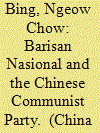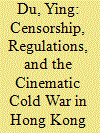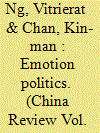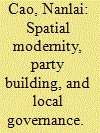|
|
|
Sort Order |
|
|
|
Items / Page
|
|
|
|
|
|
|
| Srl | Item |
| 1 |
ID:
151407


|
|
|
|
|
| Summary/Abstract |
As Malaysia and China have become “comprehensive strategic partners”
since 2013, the bilateral relations of these two countries have been
getting stronger. However, party-to-party relations between the two
countries have not received much scholarly attention. This article
discusses the Chinese Communist Party’s (CCP) interactions with the
Barisan Nasional (BN) coalition and its main component parties,
United Malays National Organization (UMNO) and Malaysian Chinese
Association (MCA) in Malaysia. It discusses the origins of China’s
party-based diplomacy, the actual development in this area of diplomacy
between Malaysia and China, and the implications of this kind of
party-based diplomacy. It suggests that one of the main activities
carried out under party-based diplomacy is for CCP to offer its
governing lessons to other ruling parties, which has not been discussed
much by other analysts of China’s party-based diplomacy
|
|
|
|
|
|
|
|
|
|
|
|
|
|
|
|
| 2 |
ID:
151409


|
|
|
|
|
| Summary/Abstract |
Based primarily on archives from Hong Kong, the United Kingdom,
and the United States Information Service (USIS), this article uncovers
the trajectory of the Hong Kong fi lm political censorship system from
1947 to 1971 through interrogating interactions between the confi guration
of a series of regulations and misgivings about and treatments of
imported PRC, USIS, and Taiwan fi lms that had political references. I
examine colonial political censorship of imported films as a local
response to both Chinese politics (the CCP vs. the KMT) and Cold War
politics (the PRC vs. the United States-plus-Taiwan, the PRC vs. the
United Kingdom-plus-Hong Kong), on the one hand; and as a strategy
of cultural governance vis-à-vis the vulnerability of Hong Kong and the
control of the internal stability during the 1950s and 1960s, on the
other. I argue that the censorship system helped the colonial authorities
maintain a degree of cultural autonomy vis-à-vis both UK imperial
policy and the cinematic propaganda war between the PRC and the
United States-plus-Taiwan in Hong Kong during this turbulent period.
|
|
|
|
|
|
|
|
|
|
|
|
|
|
|
|
| 3 |
ID:
151408


|
|
|
|
|
| Summary/Abstract |
This study explores the role of emotion in political mobilization by
studying People Power, a radical group in Hong Kong. Th e group abandoned
their disruptive approach and adopted a new tactic of social
movement—joyous resistance—which attracted large numbers of participants
and thus became a powerful political force exerting great pressure
on the government. Th is case shows that festive emotion can be an intangible
resource that reduces the cost of participation compared with
confrontational tactics. Th e cathartic function of joyous resistance also
reduces the potential for violence during mobilization. After the
Umbrella Movement, there has been debate on whether more confrontational
or even violent tactics should be adopted in social movements.
Th e idea of joyous resistance will remain an important option for social
movement organizers considering the sustainability of mobilization in a
moderate society such as Hong Kong.
|
|
|
|
|
|
|
|
|
|
|
|
|
|
|
|
| 4 |
ID:
151405


|
|
|
|
|
| Summary/Abstract |
China holds direct elections for deputies to serve in the Local People’s
Congress (LPC) at the county and township levels. As the LPC gains
more power and private entrepreneur deputies emerge as the second
largest deputy group in many regions, it seems possible that the LPC
will become more representative and therefore make local government
more responsive. Th e author performed intensive fi eldwork to investigate
whether this might be occurring, but found that the LPC is more
like an inclusive institution, sometimes degenerating into patron clientelism,
rather than a representative institution. In addition, direct elections
are tightly controlled and sometimes deteriorate into personalized
patronages, because private entrepreneurs purchase votes to win
personal privileges, rather than to promote institutional reform.
|
|
|
|
|
|
|
|
|
|
|
|
|
|
|
|
| 5 |
ID:
151406


|
|
|
|
|
| Summary/Abstract |
While Christianity is among the fastest growing religions in the reform
era, state-led sporadic demolition campaigns have targeted unauthorized
church structures and sites in order to contain massive Christian
growth, especially in regions where there is a high concentration of
Christian population. Such campaigns oft en stir heated international
concerns about China’s religious freedom violations, naturally making
church-state relations the recurring central theme of both public and
academic discourses on the church in China. However, a heightened
emphasis on church-state tensions and religious persecution may
obscure the cultural and spatial dimensions of local church development.
Focusing on the case of the recent campaign against rooft op
crosses in Wenzhou—the most Christianized Chinese city, I go beyond
the one-dimensional framework of church-state relations by off ering a multifaceted analysis of the local religious scene in the political
economic contexts of contested spatial modernity and of central-local
relations amid the party-building process. In so doing, I methodologically
place Chinese Christian studies at the center of contemporary
China studies.
|
|
|
|
|
|
|
|
|
|
|
|
|
|
|
|
|
|
|
|
|